情态动词详解
(最新整理)高中英语情态动词详解(强推)

2021/7/26
21
1. It has been announced that candidates(候选 人) ____ remain in their seats until all the papers have been collected.
A. can B. will C. may D. hall 用于第二、三人称,表示允诺、警告、
威胁、命令、决心等。
You shall have a nice present for your birthday. (允诺) You shall be sorry for what you have done. (警告)
When he comes in nobody shall say a word. (命令) Nothing shall stop us from carrying out this plan. (决心)
2021/7/26
10
注意:
may I …? 的答语. 肯定: Yes, you may . 否定: No, you mustn’t (语气强硬)
No, you may not. 或 No, you’d better not.
2021/7/26
11
2.表“许可”
You may take the boy there He said that I might use his telephone.
A.will B. would C. should D. must
What time ought I _______?
A.arrived
B.arriving
C.arrive
D.to arrive
He _______ speak to his mother like that. A.ought not to B.doesn’t ought to C.not ought to D.ought to not
情态动词详解

I 情态动词的定义情态动词是一种本身有一定的词义,表示说话人的情绪、态度或语气的动词,但不能单独作谓语,只能和其他动词原形构成谓语。
情态动词数量不多,但用途广泛,主要有:can (could), may (might), must, need, ought to, dare (dared), shall (should), will (would) .II 情态动词的位置情态动词在句中放在谓语动词之前,谓语动词前若有助动词,则在助动词之前,疑问句中,情态动词放在主语之前。
•I can see you. Come here. 我能看见你,过来吧。
•He must have been away. 他一定走了。
•What can I do for you? 你要什么?•How dare you treat us like that! 你怎么敢那样对待我们!Ⅲ情态动词的语法特征1)情态动词不能表示正在发生或已经发生的事情,只表示期待或估计某事的发生。
2)情态动词除ought 和have 外,后面只能接动词原形。
3)情态动词没有人称,数的变化,即情态动词第三人称单数不加-s。
4)情态动词没有非谓语形式,即没有不定式,分词,等形式。
Ⅳ情态动词的用法A. can; could; be able tocan1. 表示“能力”(此时过去时是could)What can you do?2. 表示许可、请求,“可以”。
在口语中,can可以代替may表示许可,而may比较正式。
(此时用could或might语气更委婉)--Can/Could I go now?--Y es, you can.3 表示推测(否,疑),把握很大,could也可表推测(肯,否,疑),把握比can小。
--Look! Someone is coming! Who can it be?--It can‟t be him. He has gone to Paris.(不可能)He could be here soon. 他很快就来。
情态动词详解
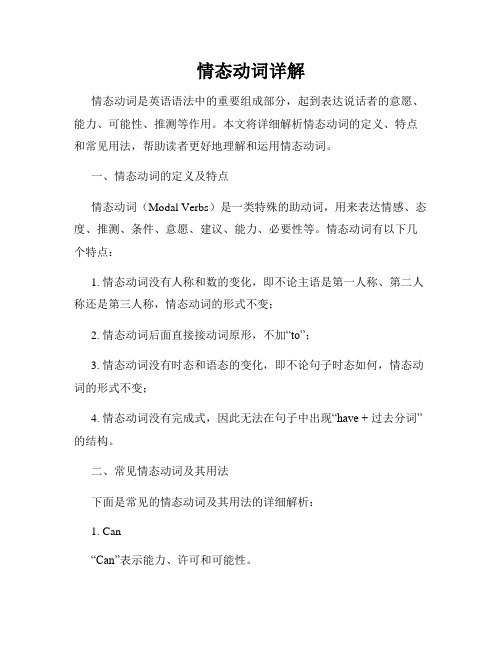
情态动词详解情态动词是英语语法中的重要组成部分,起到表达说话者的意愿、能力、可能性、推测等作用。
本文将详细解析情态动词的定义、特点和常见用法,帮助读者更好地理解和运用情态动词。
一、情态动词的定义及特点情态动词(Modal Verbs)是一类特殊的助动词,用来表达情感、态度、推测、条件、意愿、建议、能力、必要性等。
情态动词有以下几个特点:1. 情态动词没有人称和数的变化,即不论主语是第一人称、第二人称还是第三人称,情态动词的形式不变;2. 情态动词后面直接接动词原形,不加“to”;3. 情态动词没有时态和语态的变化,即不论句子时态如何,情态动词的形式不变;4. 情态动词没有完成式,因此无法在句子中出现“have + 过去分词”的结构。
二、常见情态动词及其用法下面是常见的情态动词及其用法的详细解析:1. Can“Can”表示能力、许可和可能性。
能力:用于表达某人在某方面具有的能力或技能。
例句:He can speak three languages.许可:用于征求或给予许可。
例句:Can I borrow your pen, please?可能性:用于表达可能发生的情况。
例句:It can rain tomorrow.2. Could“Could”是Can的过去式,表示过去或虚拟条件下的能力、许可和可能性。
能力(过去):用于表达过去具备的能力或技能。
例句:When I was young, I could run very fast.许可(过去):用于过去征求或给予许可。
例句:Could I use your phone yesterday?可能性(虚拟条件):用于表示虚拟情况下的可能性。
例句:If I had enough money, I could travel around the world.3. May“May”表示允许、可能性、祝愿和推测。
允许:用于征求或给予许可。
例句:May I come in?可能性:用于表达主观推测的可能性。
初中英语情态动词知识详解及经典例句
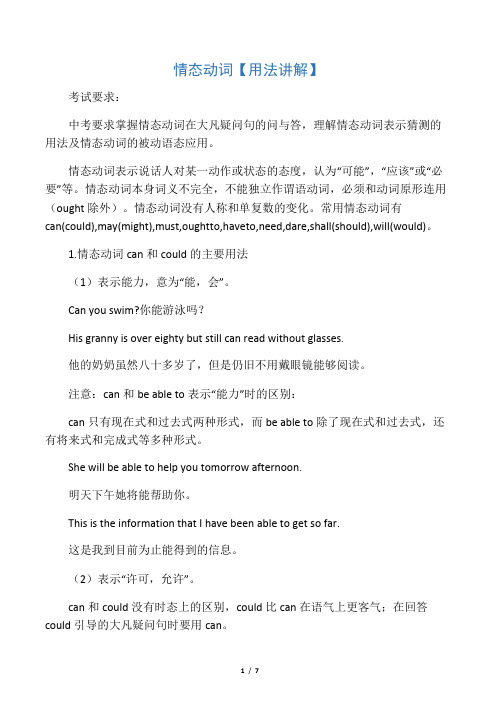
情态动词【用法讲解】考试要求:中考要求掌握情态动词在大凡疑问句的问与答,理解情态动词表示猜测的用法及情态动词的被动语态应用。
情态动词表示说话人对某一动作或状态的态度,认为“可能”,“应该”或“必要”等。
情态动词本身词义不完全,不能独立作谓语动词,必须和动词原形连用(ought除外)。
情态动词没有人称和单复数的变化。
常用情态动词有can(could),may(might),must,oughtto,haveto,need,dare,shall(should),will(would)。
1.情态动词can和could的主要用法(1)表示能力,意为“能,会”。
Can you swim?你能游泳吗?His granny is over eighty but still can read without glasses.他的奶奶虽然八十多岁了,但是仍旧不用戴眼镜能够阅读。
注意:can和be able to表示“能力”时的区别:can只有现在式和过去式两种形式,而be able to除了现在式和过去式,还有将来式和完成式等多种形式。
She will be able to help you tomorrow afternoon.明天下午她将能帮助你。
This is the information that I have been able to get so far.这是我到目前为止能得到的信息。
(2)表示“许可,允许”。
can和could没有时态上的区别,could比can在语气上更客气;在回答could引导的大凡疑问句时要用can。
Could/Can you tell me the way to the railway station?你能告诉我去火车站的路吗?—Could I use your pen?我可以用你的钢笔吗?—Yes, of course you can.是,当然你可以。
(3)表示“可能”,can多用于否定句和疑问句。
高考英语情态动词用法详解
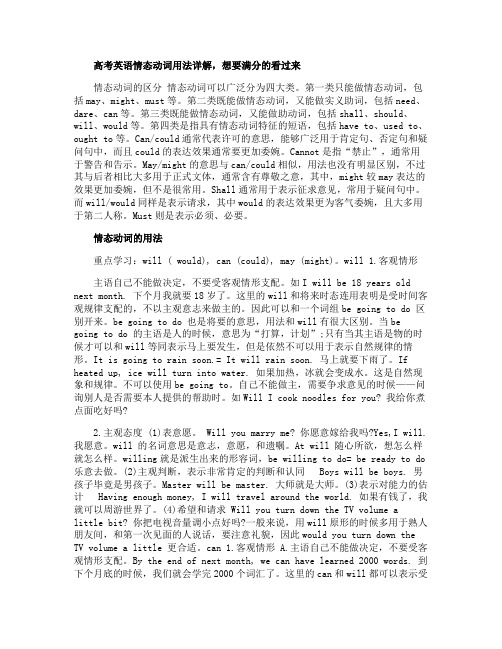
高考英语情态动词用法详解,想要满分的看过来情态动词的区分情态动词可以广泛分为四大类。
第一类只能做情态动词,包括may、might、must等。
第二类既能做情态动词,又能做实义助词,包括need、dare、can等。
第三类既能做情态动词,又能做助动词,包括shall、should、will、would等。
第四类是指具有情态动词特征的短语,包括have to、used to、ought to等。
Can/could通常代表许可的意思,能够广泛用于肯定句、否定句和疑问句中,而且could的表达效果通常要更加委婉。
Cannot是指“禁止”,通常用于警告和告示。
May/might的意思与can/could相似,用法也没有明显区别,不过其与后者相比大多用于正式文体,通常含有尊敬之意,其中,might较may表达的效果更加委婉,但不是很常用。
Shall通常用于表示征求意见,常用于疑问句中。
而will/would同样是表示请求,其中would的表达效果更为客气委婉,且大多用于第二人称。
Must则是表示必须、必要。
情态动词的用法重点学习:will ( would), can (could), may (might)。
will 1.客观情形主语自己不能做决定,不要受客观情形支配。
如I will be 18 years old next month. 下个月我就要18岁了。
这里的will和将来时态连用表明是受时间客观规律支配的,不以主观意志来做主的。
因此可以和一个词组be going to do 区别开来。
be going to do 也是将要的意思,用法和will有很大区别。
当be going to do 的主语是人的时候,意思为“打算,计划”;只有当其主语是物的时候才可以和will等同表示马上要发生,但是依然不可以用于表示自然规律的情形。
It is going to rain soon.= It will rain soon. 马上就要下雨了。
情态动词用法归纳总结

情态动词用法归纳总结情态动词是一类用来表示说话人的态度、观点和意愿的动词,具有一定的语法特点。
以下是情态动词的一些常见用法归纳总结:1.表示能力、可能性和推测:- Can: 表示能力和可能性,用于肯定句;例如:“I can swim.”(我会游泳。
)- Could: 表示能力和可能性,用于疑问句和否定句;例如:“Could you help me?”(你能帮助我吗?)- May/might: 表示可能性和推测;例如:“He may be busy.”(他可能很忙。
)- Must: 表示强烈的推测或肯定;例如:“He must be tired.”(他一定很累。
)2.表示许可和建议:- Can: 表示允许和禁止,用于肯定句;例如:“You can go now.”(你现在可以走了。
)- Could: 表示请求允许,用于疑问句和否定句;例如:“Could I borrow your pen?”(我可以借用你的笔吗?)- May/might: 表示请求允许;例如:“May I use your phone?”(我可以用一下你的手机吗?)- Should: 表示建议;例如:“You should eat more vegetables.”(你应该多吃蔬菜。
)3.表示义务和推测:- Must: 表示必须和义务;例如:“You must finish your homework.”(你必须完成作业。
)- Have to: 表示必须和义务;例如:“I have to go to work tomorrow.”(我明天必须去上班。
)4.表示可能性和意愿:- Can: 表示可能性和意愿,用于肯定句;例如:“I can help you with that.”(我可以帮你做那个。
)- Could: 表示可能性和意愿,用于疑问句和否定句;例如:“Could you please pass me the salt?”(请你把盐递给我好吗?)- May/might: 表示可能性和意愿;例如:“I may go to the party tonight.”(今晚我可能会去参加派对。
高中情态动词用法详解
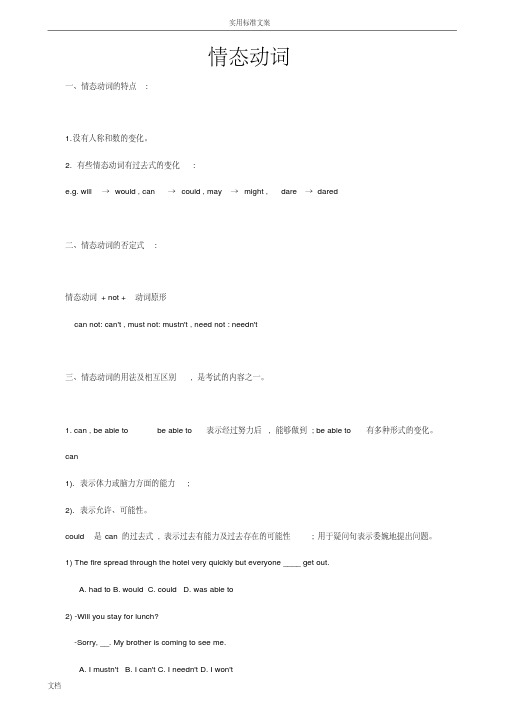
情态动词一、情态动词的特点:1.没有人称和数的变化。
2. 有些情态动词有过去式的变化:e.g. will →would , can →could , may→might , dare →dared二、情态动词的否定式:情态动词+ not +动词原形can not: can't , must not: mustn't , need not : needn't三、情态动词的用法及相互区别, 是考试的内容之一。
1. can , be able to be able to 表示经过努力后, 能够做到; be able to 有多种形式的变化。
can1). 表示体力或脑力方面的能力;2). 表示允许、可能性。
could 是can的过去式, 表示过去有能力及过去存在的可能性; 用于疑问句表示委婉地提出问题。
1) The fire spread through the hotel very quickly but everyone ____ get out.A. had toB. wouldC. couldD. was able to2) -Will you stay for lunch?-Sorry, __. My brother is coming to see me.A. I mustn'tB. I can'tC. I needn'tD. I won't2.may 表示询问或说明一件事可不可做; 表示某事有可能发生。
might是may的过去式; 用在疑问中比may委婉、客气。
1) -May I take this book out of the reading-room?-No, you mustn't. ( Yes, you may.)2) -Might I make a suggestion? -Yes, you may.3. must1). 表示必须要做的事: 必须2) 表示很有把握的推断: 一定, 准是。
情态动词在疑问句中的用法详解
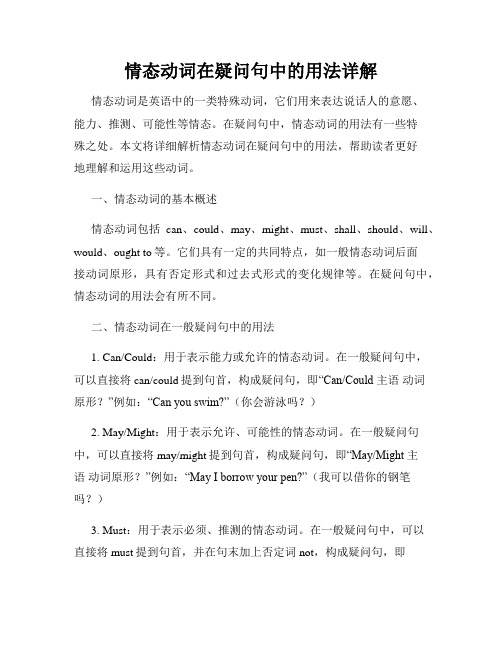
情态动词在疑问句中的用法详解情态动词是英语中的一类特殊动词,它们用来表达说话人的意愿、能力、推测、可能性等情态。
在疑问句中,情态动词的用法有一些特殊之处。
本文将详细解析情态动词在疑问句中的用法,帮助读者更好地理解和运用这些动词。
一、情态动词的基本概述情态动词包括can、could、may、might、must、shall、should、will、would、ought to等。
它们具有一定的共同特点,如一般情态动词后面接动词原形,具有否定形式和过去式形式的变化规律等。
在疑问句中,情态动词的用法会有所不同。
二、情态动词在一般疑问句中的用法1. Can/Could:用于表示能力或允许的情态动词。
在一般疑问句中,可以直接将can/could提到句首,构成疑问句,即“Can/Could 主语动词原形?”例如:“Can you swim?”(你会游泳吗?)2. May/Might:用于表示允许、可能性的情态动词。
在一般疑问句中,可以直接将may/might提到句首,构成疑问句,即“May/Might 主语动词原形?”例如:“May I borrow your pen?”(我可以借你的钢笔吗?)3. Must:用于表示必须、推测的情态动词。
在一般疑问句中,可以直接将must提到句首,并在句末加上否定词not,构成疑问句,即“Must 主语动词原形?”例如:“Must I finish the project today?”(我必须今天完成这个项目吗?)4. Shall/Should:用于表示建议、意图的情态动词。
在一般疑问句中,可以直接将shall/should提到句首,构成疑问句,即“Shall/Should 主语动词原形?”例如:“Shall we go to the park tomorrow?”(明天我们去公园好吗?)5. Will/Would:用于表示意愿、请求的情态动词。
在一般疑问句中,可以直接将will/would提到句首,构成疑问句,即“Will/Would 主语动词原形?”例如:“Will you help me with my homework?”(你能帮我做作业吗?)6. Ought to:用于表示应该、责任的情态动词。
情态动词用法详解:表达能力、可能性、请求、义务和意愿
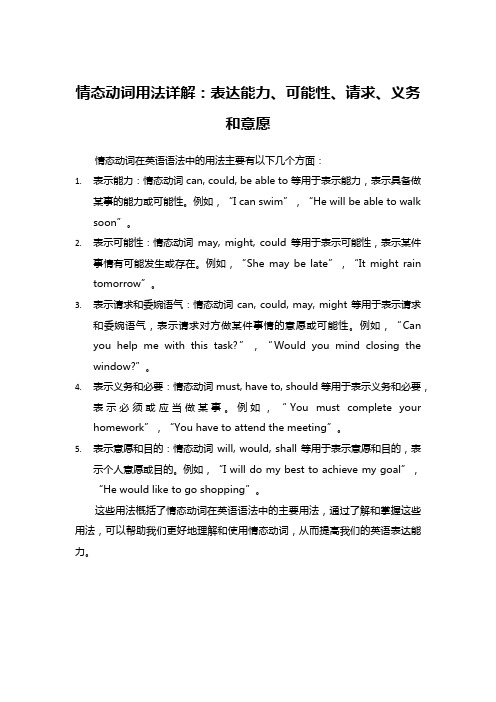
情态动词用法详解:表达能力、可能性、请求、义务和意愿情态动词在英语语法中的用法主要有以下几个方面:1.表示能力:情态动词 can, could, be able to 等用于表示能力,表示具备做某事的能力或可能性。
例如,“I can swim”,“He will be able to walk soon”。
2.表示可能性:情态动词may, might, could 等用于表示可能性,表示某件事情有可能发生或存在。
例如,“She may be late”,“It might rain tomorrow”。
3.表示请求和委婉语气:情态动词 can, could, may, might 等用于表示请求和委婉语气,表示请求对方做某件事情的意愿或可能性。
例如,“Can you help me with this task?”,“Would you mind closing the window?”。
4.表示义务和必要:情态动词 must, have to, should 等用于表示义务和必要,表示必须或应当做某事。
例如,“You must complete your homework”,“You have to attend the meeting”。
5.表示意愿和目的:情态动词 will, would, shall 等用于表示意愿和目的,表示个人意愿或目的。
例如,“I will do my best to achieve my goal”,“He would like to go shopping”。
这些用法概括了情态动词在英语语法中的主要用法,通过了解和掌握这些用法,可以帮助我们更好地理解和使用情态动词,从而提高我们的英语表达能力。
英语情态动词详解

can / could的用法
3. 表示推测, 含惊讶、怀疑的语气, 只用在疑问、 否定、感叹句中。
----It’s so late. Can Tom be reading? (疑问) ----It can’t be Mary. She has fallen ill. (否定) ----How can you be so careless! (感叹)
can / could的用法
4. cannot too译为“无论怎样…也不为过; 越…越 好”。
----You cannot be too careful while driving a car on such a dark night.
may / might的用法
1. 表示许可。 = be allowed to do ----You may go now. ----May/Might I dance with you? 回答: Yes, you may/can. No, you mustn’t.
must 的用法
与have to的区别: ③否定意义不同 mustn’t表示禁止, 译为“不准”、“不允许”。 don’t have to译为“不必”。 ----You mustn’t smoke in the office. ----You don’t have to call back tonight.
2. should表惊讶, 惋惜, 译为“竟然”。 ----I find it astonishing that he should be so
rude to you. ----I didn’t expect that he should have
finished the job ahead of time.
2023年江苏中考英语核心语法精讲精练专题09 情态动词-含详解
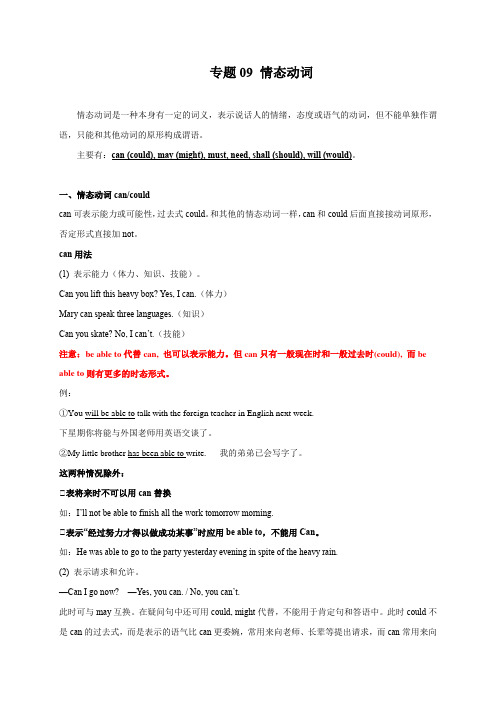
专题09 情态动词情态动词是一种本身有一定的词义,表示说话人的情绪,态度或语气的动词,但不能单独作谓语,只能和其他动词的原形构成谓语。
主要有:can (could), may (might), must, need, shall (should), will (would)。
一、情态动词can/couldcan可表示能力或可能性,过去式could。
和其他的情态动词一样,can和could后面直接接动词原形,否定形式直接加not。
can用法(1) 表示能力(体力、知识、技能)。
Can you lift this heavy box? Yes, I can.(体力)Mary can speak three languages.(知识)Can you skate? No, I can’t.(技能)注意:be able to代替can, 也可以表示能力。
但can只有一般现在时和一般过去时(could), 而be able to则有更多的时态形式。
例:①You will be able to talk with the foreign teacher in English next week.下星期你将能与外国老师用英语交谈了。
②My little brother has been able to write. 我的弟弟已会写字了。
这两种情况除外:①表将来时不可以用can替换如:I’ll not be able to finish all the work tomorrow morning.①表示“经过努力才得以做成功某事”时应用be able to,不能用Can。
如:He was able to go to the party yesterday evening in spite of the heavy rain.(2) 表示请求和允许。
—Can I go now? —Yes, you can. / No, you can’t.此时可与may互换。
情态动词详解和区分
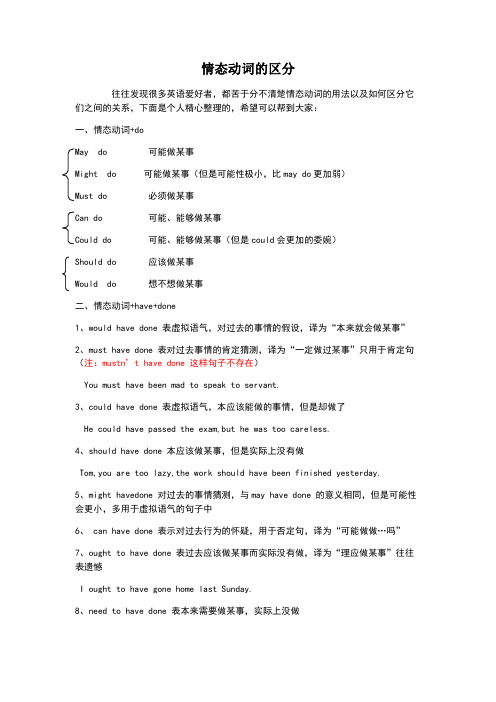
情态动词的区分往往发现很多英语爱好者,都苦于分不清楚情态动词的用法以及如何区分它们之间的关系,下面是个人精心整理的,希望可以帮到大家:一、情态动词+doMay do 可能做某事Might do 可能做某事(但是可能性极小,比may do更加弱)Must do 必须做某事Can do 可能、能够做某事Could do 可能、能够做某事(但是could会更加的委婉)Should do 应该做某事Would do 想不想做某事二、情态动词+have+done1、would have done 表虚拟语气,对过去的事情的假设,译为“本来就会做某事”2、must have done 表对过去事情的肯定猜测,译为“一定做过某事”只用于肯定句(注:mustn’t have done 这样句子不存在)You must have been mad to speak to servant.3、could have done 表虚拟语气,本应该能做的事情,但是却做了He could have passed the exam,but he was too careless.4、should have done 本应该做某事,但是实际上没有做Tom,you are too lazy,the work should have been finished yesterday.5、might havedone 对过去的事情猜测,与may have done 的意义相同,但是可能性会更小,多用于虚拟语气的句子中6、 can have done 表示对过去行为的怀疑,用于否定句,译为“可能做做…吗”7、ought to have done 表过去应该做某事而实际没有做,译为“理应做某事”往往表遗憾I ought to have gone home last Sunday.8、need to have done 表本来需要做某事,实际上没做I need have returned this book to Jack,but I was too busy to give it back to him.9、May have done 表对过去的事情的推测,译为“可能已经”或“也许已经”用于肯定句I don’t know ,he may have gone lost.三、情态动词的否定形式+have +donewouldn’t have done 本来不会做某事would have done 本来会做某事,但是没有做couldn’t have done 不会做某事(不可能做的事情)can have done 不能做某事can/could have done 本来会/能够做某事,实际上没有做should have done 本不应该做某事,但是实际上却做了=ought not to have doneShould have done 本应该做某事,但是实际上未做Needn’t have done 本来不需要做某事,但是却做了Need have done 本来需要做某事,但是没有做Must do 不表示猜测,必须去做某事Must have done 那时….怎样He must be young 他一定很年轻He must have been young 他那时候很年轻。
高中英语语法:情态动词的详解大总结

高中英语语法:情态动词的详解大总结一、can和could1、can的用法(1)表示体力和脑力方面的能力。
(2)表示对现在的动作或状态进行主观的猜测,主要用在否定句和疑问句中。
(3)表示可能性,理论上的可能性,意为“有时候可能会”,可用于肯定句。
(4)表示允许,意思与may接近。
(5)表示说话人的推测、怀疑、惊异、猜测或不肯定等,主要用于否定句、疑问句或感叹句中。
(6)can的特殊句型cannot…too / enough表示“无论怎么...也不过分”“越...越好”cannot but+ do sth.表示“不得不,只好”2、could的用法(1)表示能力,指的是过去时间。
(2)表示允许,指的是过去时间。
(3)表示可能,可以指过去时间,也可以指现在时间,表示语气缓和。
(4)委婉客气地提出问题或陈述看法,指的是现在时间。
主要用于疑问句,回答时用can。
3、can与could的区别can表推测时只用于否定句和疑问句(could无此限制)。
couldn’t的可能性比can’t小。
4、can与be able to的区别(1)现在时:无区别,但后者不常用。
(2)完成时;can没有完成时,此时要用have (has,had)been able to。
(3)将来时:can没有将来时,要用will be able to。
(4)过去时:could表示一般能力,was/were able to 表示在具体场合通过努力成功做成某事的能力。
二、may 和might1、may的用法(1)表示询问或说明一件事可不可以做。
(2)表示一件事或许会发生或某种情况可能会存在,通常用在肯定句和否定句中。
注意:表示可能性时,can’t语气强,表示“不可能”,may not语气弱,表示“可能不”。
2、might的用法(1)表示询问或允许,指的是过去时间。
(2)表示可能发生的事,可以指过去时间,也可以指现在时间,语气更加不肯定,可能性比may小一些。
10个重要情态动词用法详解

1. can⑴ 表示能力,一般译为“能、会”,尤其指生来具备的能力。
如:She can swim fast, but I can’t .⑵ 表示许可,常在口语中。
如: Youcanuse my dictionary.⑶表示推测,意为“可能”,常用于否定句和疑问句中,此时 can’t 译为“不可能”。
如:—Can the news be true? — No, it can’t be our teacher. He is on a visit to the Great Wal l.2. could⑴ can 的过去式,意为“能、会”,表示过去的能力。
如: He could write poems when he was 10.⑵ could 在疑问句中,表示委婉请求的语气,此时 could 没有过去式的意思。
如:Could you do me a favour?—Could I use your pen? —Yes, youcan. (注意回答)3. may⑴ 表示请求、许可,比 can 正式,如: May I borrow your bike? Youmay gohomenow.⑵ 表示推测,谈论可能性,意为“可能,或许”,一般用于肯定句中。
如: Itmay raintomorrow . Shemay be at home.⑶ may 的过去式为 might。
might 也可以表示可能性低于 may (此时 might 没有过去式的意思)。
如: He is away from school. He might be sick.⑷ 表示希望、祈求、祝愿,常可译为“祝愿”。
通常是用 may +主+V如: May you have a good time.May you be happy!May you succeed !4. must⑴ must 表示主观看法,意为“必须”。
如: You must stay here until I come back.Must I hand in my homework right now?⑵对 must 引导的疑问句,肯定回答为 must,否定回答为 needn’t 或 don’t have to .如:— Must I finish my homework? —No, you needn’t.⑶ must 也可以表示有把握的推测,意为“ 一定,肯定”,用于肯定句。
情态动词详解

情态动词详解情态动词是英语语法中的重要部分,它们用来表示说话人在陈述一个行为或状态时的态度、意愿、能力等。
本文将详细介绍情态动词的定义、用法及其常见的不同情态动词。
一、情态动词的定义情态动词是一类特殊的动词,用来表示说话人的态度、意愿、能力和推测等。
情态动词通常与动词原形搭配使用,不进行时态和数的变化。
而且情态动词具备一些特殊的语法性质,例如后面的动词要用原形,否定式的构成要用not和情态动词本身。
二、情态动词的用法1. 表示能力和能否情态动词can用来表示能力,通常用于肯定句中。
例如:I can swim.(我会游泳。
)情态动词can的否定式为cannot或can't,表示不能。
例如:She can't understand it.(她不能理解。
)2. 表示许可和禁止情态动词may用来表示许可,通常用于疑问句和正式的请求中。
例如:May I borrow your pen?(我可以借用你的钢笔吗?)情态动词may 的否定式为may not或mayn't,表示禁止。
例如:You may not enter without permission.(未经许可,你不能进入。
)3. 表示推测和猜测情态动词might和could用来表示推测和猜测,也可以用来表示过去的能力。
例如:He might be at home.(他可能在家。
)情态动词might的否定形式为might not,could的否定形式为could not或couldn't。
4. 表示可能性和必然性情态动词must用来表示肯定、推测的必然性和强烈的判断。
例如:It must be true.(这肯定是真的。
)情态动词must的否定形式为mustnot或mustn't,表示禁止或禁止的推测。
5. 表示建议与义务情态动词should和ought to用来表示应该或是建议的意思。
例如:You should study hard.(你应该努力学习。
情态动词详解公开课获奖课件

二、表推测 。 也许性可分为客观也许性和详细事情实际发
生也许性两种。 所谓客观(理论)也许性即不包括详细某事
与否发生, 此种使用措施常常可以阐明人 或事物特性。 情态动词 can 可用于必然句中表达客观 / 理 论也许性, 而表达详细事情发生也许性时, can 一般不用 于必然句。
Accident can happen on such rainy days. (客观也许性)
第11页
二、表推测 。 1. 也许性可分为客观也许性和详细事情实际发
生也许性两种。所谓客观(理论)也许性 即不包括详细某事与否发生, 此种使用措施 常常可以阐明人或事物特性。情态动词 can 可用于必然句中表达客观 / 理论也许性, 而表达详细事情发生也许性时, can 一般不 用于必然句。 Accident can happen on such rainy days. (客 观也许性) Peter may e with us tonight, but he isn’t sure yet. (实际也许性, 不用 can,而用 may.
第16页
三、 “情态动词 + have done “ 使用措施一 览表
1. must have done 表达对过去已经发生行为进行推测, 意为 “想必 / 准是/ 一定做了某事
It must have rained last night, for the road was quite muddy.
情态动词在句中放在谓语动词之前,谓 语动词前若有助动词,则在助动词之前, 疑问句中, 情态动词放在主语之前。 I can see you. Come here. 我能看见你, 过来吧。 He must have been away. 他一定走了。 What can I do for you? 你要什么? How dare you treat us like that! 你怎么 敢那样看待我们!
情态动词详解(含练习题100道和答案)
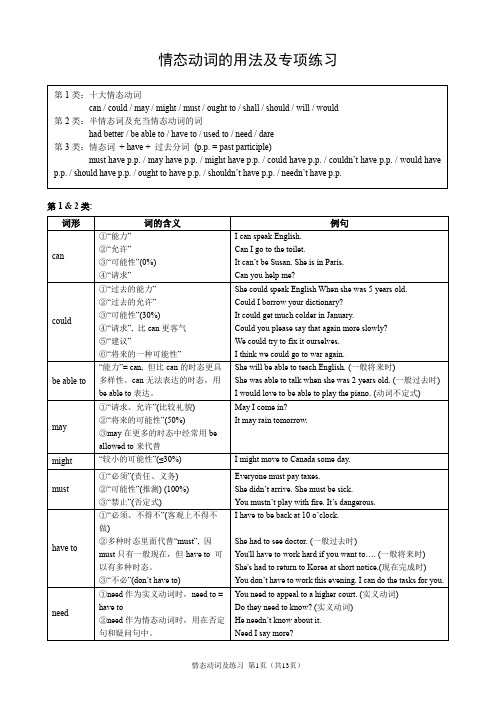
情态动词的用法及专项练习第1 & 2类:第3类:1.could have p.p.①指过去某事有可能发生, 但并未.真的..发生。
They could have won the race, but they didn't try hard enough.He could have studied harder, but he was too lazy and that's why he failed the exam.②指过去有能力做某事, 但并未真的...做过。
I could have stayed up late, but I decided to go to bed early.Julie could have bought the book, but she borrowed it from the library instead.③对过去的发生事情做出一种猜测,但实际上并不知道真假。
仅仅是做一种观点上的表达。
He could have got stuck in traffic.He could have forgotten that we were meeting today.He could have overslept.2. may / might have p.p.(用法与could have p.p.第③点相同)对过去的发生事情做出一种猜测,但实际上并不知道真假。
仅仅是做一种观点上的表达。
He might have got stuck in traffic.He might have forgotten that we were meeting today.He might have overslept.3. couldn't have p.p.渴望、期望做某事, 但由于外部原因不可能做成, 即便是很想做。
是一种虚拟语气。
I couldn't have arrived any earlier. There was a terrible traffic jam (= it was impossible for me to have arrivedany earlier).He couldn't have passed the exam, even if he had studied harder. It's a really, really difficult exam.4. should / ought to have p.p.有一个好主意,该做而没有做。
高中英语知识点归纳情态动词和实义动词的用法区别详解

高中英语知识点归纳情态动词和实义动词的用法区别详解英语中的动词类型有很多种,其中情态动词和实义动词是我们需要特别关注的两种类型。
两者在用法上有很大的区别,下面将详细解析情态动词和实义动词的用法区别。
一、情态动词的定义和使用情态动词是一种特殊的动词类型,不能单独使用,必须和其他动词一起构成谓语。
常见的情态动词有:can, could, may, might, must, shall, should, will, would等。
1. 表示能力和可能性情态动词常用来表示说话人的能力、可能性和许可性。
例如:- I can swim.(我会游泳。
)- She might come to the party.(她可能会来参加派对。
)- You may leave now.(你现在可以离开了。
)值得注意的是,can和may在疑问句中用于征求对方的许可或询问可能性。
例如:- Can I borrow your pen?(我可以借用你的笔吗?)- May I open the window?(我可以打开窗子吗?)2. 表示推测和建议情态动词还可以用来表示说话人的主观推测和建议。
例如:- He must be tired.(他一定很累。
)- You should see a doctor.(你应该去看医生。
)3. 表示义务和必要性情态动词有时用来表示义务和必要性。
例如:- Students must wear uniforms.(学生们必须穿制服。
)- We should protect the environment.(我们应该保护环境。
)二、实义动词的定义和使用实义动词是指具有实际意义的动词,可以独立构成谓语。
实义动词常见的分类有:行为动词、感观动词、状态动词等。
1. 表示具体动作或行为实义动词常用来表示具体的动作或行为。
例如:- He runs every morning.(他每天早上跑步。
)- She sings beautifully.(她唱歌唱得很美。
高中英语情态动词详细讲解及例句

高中英语情态动词详细讲解及例句-CAL-FENGHAI.-(YICAI)-Company One1一、情态动词无人称和数的变化,不能单独做谓语,只能和行为动词或状态动词构成谓语二、情态动词分为:情态助动词:can(could)、may(might)、must、have to (hadto )、ought to 、shall(should)、will(would) 12个半情态助动词:dare、need、used to、had better、would better(5个)三、情态助动词1.can and could1)ability:be able to do /manage to do/succeed in doing sth.eg.The army can defeat their enemy.eg.The army is able to defeat their enemy.eg.The army succeed in defeating their enemy.2)permission:eg.Can I smoke here?eg.You can’t smoke here.3)possibility:用在否定句、疑问句、感叹句中-eg.This can’t be done by him.当被用在肯定句中时,表达的是理论上的可能性,不涉及是否真的会发生eg.even expert drives can make mistakes.要表达现在或者将来的可能性,用may /might或could.eg.I may leave for Beijing next month.但在特殊疑问句中,或与副词hardly、only等连用的陈述句中表达可能性只用can/couldEg.where can the noise be coming from?eg.It can hardly be the postman,he comes only in the morning.4)有时会:the road can be blocked.5)could 表示轻微的怀疑或委婉的看法I’m sorry I couldn’t lend you the book now.His story could be true,but I hardly think it is.6)could 表示委婉的请求,主要用于疑问句,不用于肯定句Could you lend me some money?Yes,I can /No,I am afraid not.7)could 的常用结构:could+动词+比较级“非常,再.....不过了”It couldn’t be better.Couldn’t +过去分词+比较级“非常,再.....不过了”They couldn’t have tried harder to make me eel welcome.Can’t..too..=can never too“无论怎样...也不为过,越...越好”I can’t thank you too much.I owe my progress to you.Can’t (help/choose) but do/can but +动词原形“不得不,只好”We can but agree with him.Can’t help doing 忍不住,不得不I can’t help laughingCan’t be (it) 控制不住,没有办法It can’t be helpedCan’t....without 没有...就不能One can’t succeed without perseverance.2.may and might1)permission:May I use your pen?Yes,you may./No,you may not.2)Possibility:用于推测,表示不确定,不用于疑问句中She may know Tom’s address.出现I’m afraid.I’m not sure等表示不确定时,常用may/might.I’m afraid he might not come to attend the meeting today.从语气上判断,may表示的可能性比might 大,might更多的表示怀疑He may be very busy now.He might be very busy now.3)用于让步状语从句中However hard you may study,you cannot master English in a month.4)用于祈使句,表示祝愿May you succeed!5)might 常用于表示轻微的责备和委婉的请求You might post the letter for me if you are going near a post box.You might have let me know before!6)习惯用法:may as well do”理所当然,有足够的理由”She may be proud of her sonMay /might (just) as well do=had better do(最好)You might as well stay at home tonight.May/might as well+do A+as+do+B”与其做B不如做A”You might as well throw the money away as lend it to him.One may as well not know a thing at all as know it but imperfectly3.must and have to1)表示义务,一定要,必须You must arrive in good time.The meeting is very important.2)表示肯定性或难以避免,必然会,肯定会All men must die.3)must 表示有把握的推测,一定是,准时Must do/must be doing/must have doneThe tall fellow must be a basketball player.Let’s have something.You must be starving.He must have received mu letter which has mailed last week.4)must 表示非要,偏要,常以第二人称为主语,意指不耐或令人不愉快的事情,用于其他人称,表示主语固执,意为偏偏Why must you buy that car?Jane was never a pleasant young girl.After you gave her your advice,she must goand do the opposite.5)must 的三种否定形式表示不可能 must be --can’t be must have done--can’t have doneYou must have met him before.You can’t have met him before.表示不必 must do--need not to/don’t have toWe must get up at six tomorrow morning.We don’t have to get up at six tomorrow morning.表示决不能,严禁 must--mustn’tYou mustn’t park your car here.6)回答以must提问的句子Must we clean all the rooms?Yes ,you must/No ,you don’t have to/No ,you needn’t7)must 可做名词,表示必须有的东西,必须做的事Warm clothes are a must in the mountains.8)must和have to 表示必须时,有一下差别Must 表示的是说话人主观的看法,而have to则往往强调客观需要The play is not interesting ,I really must go now.I have to work when I was your age.Must 一般只表现在,have to 则有更多的时态。
情态动词知识点详解(初中英语专项复习)7
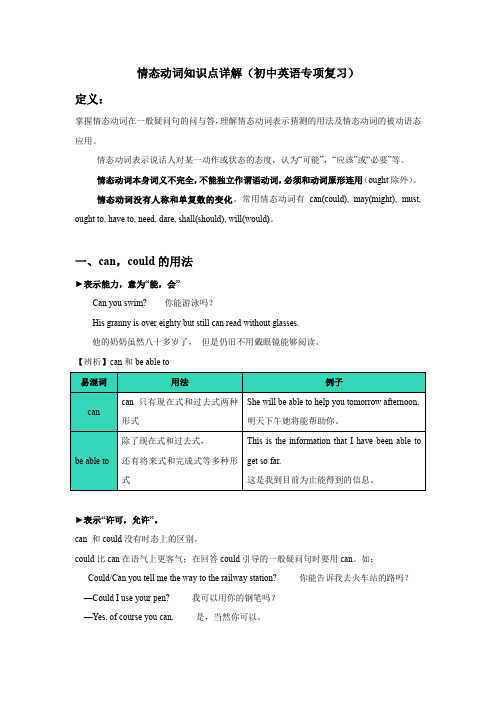
情态动词知识点详解(初中英语专项复习)定义:掌握情态动词在一般疑问句的问与答,理解情态动词表示猜测的用法及情态动词的被动语态应用。
情态动词表示说话人对某一动作或状态的态度,认为“可能”,“应该”或“必要”等。
情态动词本身词义不完全,不能独立作谓语动词,必须和动词原形连用(ought除外)。
情态动词没有人称和单复数的变化。
常用情态动词有can(could), may(might), must, ought to, have to, need, dare, shall(should), will(would)。
一、can,could的用法►表示能力,意为“能,会”Can you swim? 你能游泳吗?His granny is over eighty but still can read without glasses.他的奶奶虽然八十多岁了,但是仍旧不用戴眼镜能够阅读。
【辨析】can和be able to►表示“许可,允许”。
can 和could没有时态上的区别,could比can在语气上更客气;在回答could引导的一般疑问句时要用can。
如:Could/Can you tell me the way to the railway station? 你能告诉我去火车站的路吗?—Could I use your pen? 我可以用你的钢笔吗?—Yes, of course you can. 是,当然你可以。
►表示“可能”,can多用于否定句和疑问句。
We know that a computer can’t think for itself. 我们知道计算机不可能自己思考。
Can she still be alive after all these years? 这些年过后,她仍旧可能活着吗?►表示否定推测,意为“不可能”。
The shy boy can’t be our monitor. (对现在情况的否定推测)那个腼腆的男孩不可能是我们的班长。
- 1、下载文档前请自行甄别文档内容的完整性,平台不提供额外的编辑、内容补充、找答案等附加服务。
- 2、"仅部分预览"的文档,不可在线预览部分如存在完整性等问题,可反馈申请退款(可完整预览的文档不适用该条件!)。
- 3、如文档侵犯您的权益,请联系客服反馈,我们会尽快为您处理(人工客服工作时间:9:00-18:30)。
而表示具体事情发生的可能性时,can 一般 不用于肯定句。
Accident can happen on such rainy days. (客观的可能性)
二、表推测 。 1. 可能性可分为客观的可能性和具体事情实际
发生的可能性两种。所谓客观的(理论的) 可能性即不涉及具体某事是否发生,此种 用法常常可以说明人或事物的特征。情态 动词 can 可用于肯定句中表不用于肯定句。 Accident can happen on such rainy days. (客 观的可能性)
You ought to have done this exercise more carefully.
You shouldn’t have told her the truth.
He ought not to have treated his parents like that.
7. Needn’t have done
--- When can I come for the photos? I need them tomorrow afternoon. --- They should be ready by 12:00. (表示期 待)
三、 “情态动词 + have done “ 用法一览表
1. must have done
3. Could have done
可用于肯定句中,表示“可能已经……”之意, 此外,还可以表示过去没有实现的可能性, 意为“本应该……”.
I saw Mr. Wang just now. He couldn’t have gone to Beijing. You could have been here earlier, but you didn’t.
Peter may come with us tonight, but he isn’t sure yet. (实际的可能性,不用 can,而用
may.
2. 表示具体事情实际发生的可能性 (1)表示具体事情实际发生的可能性的层 次比较 (见下表)
(2)表示具体事情实际发生的可能性时, may, must 常用于肯定句,一般不用于否定 句和疑问句(may not表示“可能不”);
I could have worked out the problem, but I didn’t.
二、表推测 。
1. 可能性可分为客观的可能性和具体事情 实际发生的可能性两种。
所谓客观的(理论的)可能性即不涉及具体 某事是否发生,此种用法常常可以说明 人或事物的特征。
情态动词 can 可用于肯定句中表示客观的 / 理论的可能性,
This may / might be done by him. (语气一 次递减) 4)should 表示推测时,表示确定或可能有 的未来或期望,即合乎理想的情况或结果。
He should be around sixty years old. 他可 能60岁上下。 It’s nearly seven o’clock. Jack should be here at any moment. (表示确定或期待)
表示“做了本来不必去做的事情”, 注意:didn’t need to do 表示“没有必 要做而实际也免于做某事”。
You needn’t have taken a taxi here, for it was very near to my house.
I didn’t need to clean the windows. My brother did it.
8. Had better have done
用于事后的建议,含有轻微的责备语 气,意为“当时做好做了某事”,其 否定形式是
had better not have done 表示相反的意 思。
You had better have started earlier.
4)should 表示推测时,表示确定或可能有 的未来或期望,即合乎理想的情况或结果。
He should be around sixty years old. 他可 能60岁上下。 It’s nearly seven o’clock. Jack should be here at any moment. (表示确定或期待)
You might have been eaten by fish.
You might have given him more help, though you were busy.
6. Should / ought to have done
用于肯定句时,表示“本应该做某事,而实 际上未做”;用于否定句时,则表示 “不应 该做的事情反而做了”。You should have come to the meeting earlier.
will / would need
dare ought to
~ + not
won’t / wouldn’t
~ + not
needn’t
~ + not
daren’t
ought not to
oughtn’t to
had better Had better not ’d better not
情态动词的位置
情态动词的特点
情态动词无人称和数的变化,情态动 词后面跟的动词需用原形,否定式构成 是在情态动词后面加“not”。个别情态 动词有现在式和过去式两种形式,过去 式可以用来表达更加客气、委婉的语气, 时态性不强,可用于过去,现在或将来。 He could be here soon. 他很快就来。 We can't carry the heavy box. I'm sorry I can't help you. 对不起,我帮不上你。
He may not have finished the work.
He might have caught a cold.
5. Might have done 表示“本来可能……”,但实际上没有发生 的事。
另外,还可以表示“本应该或可以做某 事,”,含有轻微的责备语气。
You should not have swum in that sea.
This can’t / couldn’t be done by him. (表示不 相信)
He could be on his way home now. (could 不 如 may / might常用)
Can this be done by him? (表示一种疑惑、 惊讶)
(3)would, could, should, might 并不一定 与过去的时间有关,而是表示可能性弱于他 们相应的现在形式。如:
情态动词
否定式
缩略形式
can / could cannot / could not can’t / couldn’t
may / might ~ + not
mayn’t / mightn't
must
~ + not
mustn’t
shall / should ~ + not
shan’t / shouldn’t
4. May /might have done
表示对过去已经发生的行为的推测,意为 “也许 / 或许已经(没有) ……”. 一般只用于肯定句或否定句中(在否定句中 表示“可能不”),不用于疑问句。用 might 语气更加不肯定。
It’s too late. I think he may have gone to bed.
cannot have done表示对过去发生的行为的 怀疑和不肯定,通常用于否定句和疑问句中。
He cannot have forgotten it.
Can he have gone to his aunt’s?
3. Could have done
可用于肯定句中,表示“可能已经……”之 意,此外,还可以表示过去免于是想的可能 性,意为“本应该……”.
do something / succeeded in doing sth.
The fire spread through the hotel very
quickly but everyone was able to get out. (过去有能力并成功地做了某事)
(3) could have + 过去分词,表示过去有 能力做但未做。
I didn’t hear the phone. I must have been asleep.(表示肯定 ) This may not be done by him.(表示不确定)
表示具体事情实际发生的可能性时, can 常 用于否定句、疑问句或感叹句中,表示疑惑、 惊讶或不相信等意思;could 既可疑用于肯定 句,又可以用于否定句、疑问句中。
表示对过去已经发生的行为进行推测,意为 “想必 / 准是/ 一定做了某事
It must have rained last night, for the road was quite muddy.
The lights were out. They must have been asleep.
2. can have done
一 、表能力 :表现在的或一般的能力:表示 现在的或一般的能力用can 或 be able to. 一 般的能力是指你无论什么时候做什么事情就 能做到的能力。表示现在的能力或一般的能 力时,can比be able to 更普遍。
